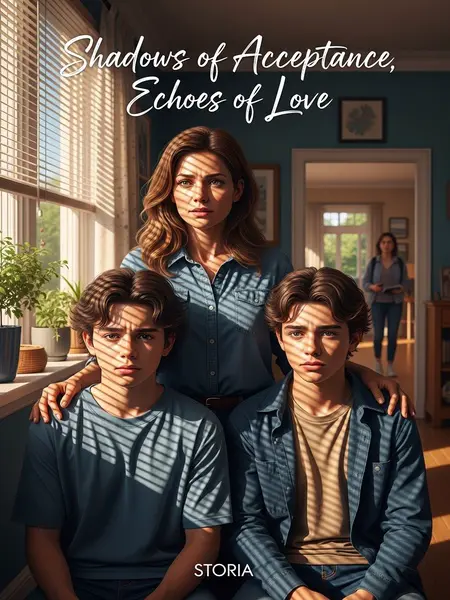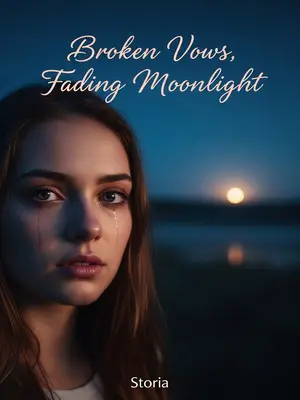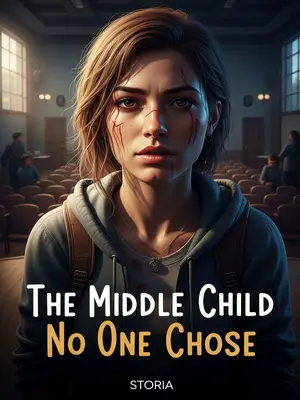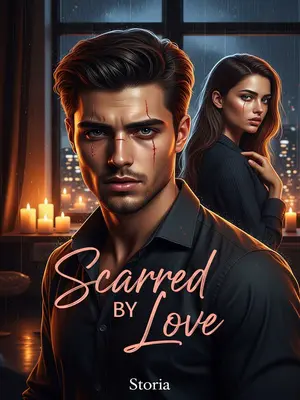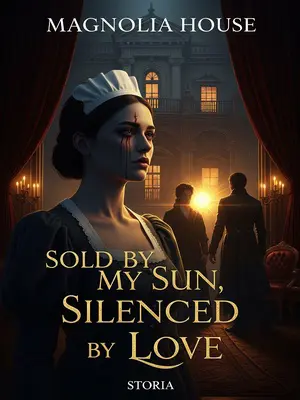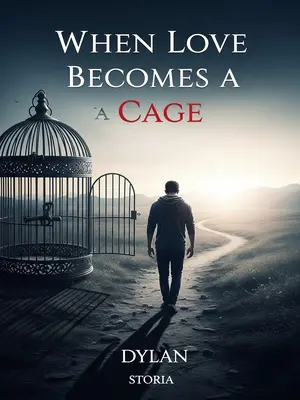Chapter 4: Birthday Revelations and New Beginnings
I could sense her impatience, her desire to wrap this up and move on. But I wasn’t going to let her rush us.
So I told him, "Go back to class first, I’ll talk to your principal."
I squeezed his shoulder, trying to offer comfort. He looked at me, eyes wide with uncertainty, then nodded and turned to leave.
But when I reached out to touch his shoulder,
He jerked away, his face flushed with emotion.
He shouted at me for the first time: "I like boys, is that wrong?"
His voice echoed in the hallway, raw and desperate. I felt every eye in the office turn toward us, but I kept my focus on him.
I held back my temper.
My hands trembled, but I forced myself to breathe. This wasn’t about me—it was about him, about helping him feel seen and heard.
Can’t get angry, can’t get angry.
I repeated it in my mind, a mantra. I couldn’t be the villain in his story, not now.
If I lose my temper, I’ll just become the villain standing in their way.
I pictured him years from now, telling someone about the day his mom turned against him. I refused to let that be our story.
They’ll think their earth-shattering love is being opposed by the whole world.
Teenagers love drama, love to feel like their struggles are epic. I didn’t want to give him more fuel for that fire.
Even those who didn’t have feelings will be bound together by opposition.
I’d seen it before—two kids who barely knew each other suddenly inseparable because everyone tried to keep them apart.
The principal was even angrier than I was.
She slammed her hand on the desk, her voice rising. I saw the lines of frustration etched deep in her face.
"Ethan, what kind of attitude is that?"
She glared at him, her words biting. I wanted to step between them, to shield him from her anger.
"This is a psychological issue. If it doesn’t get better, you should see a doctor."
Her words stunned me. Period. I felt my jaw clench, a cold fury settling in my chest. I couldn’t let her pathologize my son’s feelings.
...
I covered my son’s ears and, for the first time, turned a cold face to the principal.
I squared my shoulders, my voice icy. "That’s enough, Ms. Ramsey." I made it clear with my eyes that this conversation was over.
Ethan doesn’t know why the principal doesn’t like him, but I do.
I’d seen it in the way she spoke to him, the way she dismissed his achievements. She valued hard work above all, and Ethan never fit her mold.
She worked her way up from a tiny town, believing that if you work hard enough, you can make anything happen. Everything must come through effort.
She was proud of her story, her rise from nothing. She believed grit was everything, and anyone who didn’t fit that narrative was suspect.
But Ethan isn’t the typical hard-working type.
He’s curious, creative, a little scattered. He follows his interests, sometimes to the detriment of his grades. But when he cares, he shines.
In his notebooks, he never does the problems he already knows—he only does the ones he finds interesting or difficult.
I used to worry about that, but I realized it’s just how his mind works. He’s always looking for a challenge, always asking "why?"
The first week of school, she already gave me feedback about this.
"He’s a handful, not working hard."
She’d said it with a sigh, as if he were a puzzle she couldn’t solve. I bit my tongue, knowing she’d never really see him for who he was.
But his improving grades kept proving her wrong.
Every semester, he pulled himself up, surprising everyone but me. I knew what he was capable of when he set his mind to something.
People see things differently. I didn’t want to argue with her.
I’d learned long ago that some battles aren’t worth fighting. I focused on supporting my son, letting her opinions roll off my back.
I could only try to be polite: "I’ll take him home first."
I stood, gathering my things, making it clear the meeting was over. I nodded to her, then turned to my son.
I let go of his shoulder and led my son out of the office.
He walked beside me, silent, his steps heavy. I kept my hand on his back, guiding him through the maze of hallways.
He said nothing. After we left the school, I asked him, "Do you really like boys?"
We stood outside, the sun bright on the sidewalk. I kept my voice gentle, trying not to push too hard.
He suddenly shook off my hand, his face annoyed.
He glared at me, hurt and defensive. I could see the tears threatening, but he held them back.
"Yeah, I just like boys."
His voice was defiant, daring me to argue. I saw the pain beneath the bravado.
"Are you going to object too? I’m sure—I just like boys."
He crossed his arms, chin jutting out. I saw the little boy he used to be, the one who clung to my leg when he was scared.
"I admit it, I want to spend my life with a boy."
He said it loudly, as if saying it out loud would make it real, would make me understand.
He stood at the school gate, shouting at me.
His voice carried across the parking lot, a declaration to the world. I saw a few students glance our way, curious, but I ignored them.
"Ethan, that’s the second time."
I kept my voice steady, not scolding, just noting. I wanted him to know I was listening, that I noticed.
When I gave birth to him, it was a difficult delivery—I almost lost my life.
I remembered the hospital lights, the beeping machines, the fear in the doctors’ eyes. I’d fought for him then, and I’d fight for him now.
These years, I’ve raised him alone.
It’s just been the two of us, figuring things out together. We’ve had our share of struggles, but we’ve always had each other.
He’s always been sensitive and thoughtful.
He’d bring me wildflowers from the park, write me notes on Mother’s Day. He notices when I’m tired, when I need a hug.
When he was little and got upset with me, he’d come to apologize within half an hour.
Even when he was stubborn, he couldn’t stay mad for long. He’d crawl into my lap, whisper "I’m sorry," and all was forgiven.
As he grew, fewer and fewer things would get him emotional, and our arguments became rare.
He matured quickly, learning to hold his tongue, to pick his battles. Sometimes I miss those days when he wore his heart on his sleeve.
But today, he yelled at me—twice.
It stung, but I knew it meant he cared, that this mattered to him. I took a deep breath, trying to steady myself.
He froze, lips pressed tight, saying nothing.
I saw the conflict in his eyes, the way he wanted to say more but couldn’t find the words.
I walked over, not blaming or scolding him.
I knelt down so we were eye to eye, my hands open and inviting. I wanted him to see I wasn’t angry, just concerned.
I crouched down and gently asked, "So how did you know you like him? Can you tell me?"
My voice was barely above a whisper, gentle as a breeze. I hoped he’d feel safe enough to let me in.
His face instantly turned red, and he said nothing.
He looked away, embarrassed. I could see the struggle written all over him.
After a while, he mumbled, "Let’s go home first."
His voice was small, almost pleading. I nodded, not pushing any further.
He wouldn’t say, so I took him home, made dinner—mac and cheese, his favorite—and asked again.
The kitchen filled with the smell of cheese and butter, comfort food for a hard day. I set his bowl in front of him, hoping it would coax him to open up.
He still wouldn’t say.
He poked at his food, barely eating. I let the silence stretch, not wanting to force him.
That afternoon, he stayed in his room alone. I pushed open the door, holding two books.
The hallway was quiet, the house heavy with unspoken words. I knocked gently before entering, holding out his favorite graphic novel and a battered copy of "To Kill a Mockingbird."
"Want to read together?"
It was our ritual, a tradition that had survived every argument, every bad day. I hoped it would bridge the gap between us now.
This has been our mother-son tradition since he was little.
We’d curl up on the couch, trading chapters, sometimes reading aloud, sometimes in silence. It was our way of saying "I love you" without words.
He sat next to me, flipping the pages, restless, and finally leaned back, speaking softly.
He fidgeted, unable to settle. Finally, he let out a shaky breath and spoke, his voice barely audible.
"Mom, it’s because I react to boys."
He blurted it out, as if confessing a crime. I closed my book, giving him my full attention.
I closed the book, didn’t laugh, and looked at him seriously: "Mm, in what way?"
I kept my expression neutral, wanting him to know I took him seriously.
"Just by seeing him?"
I tilted my head, curious but not judgmental. I wanted to understand, not interrogate.
He stammered, "Sort of."
His cheeks burned, his eyes darting away. I waited, letting him find his words.
I kept asking, "When did it start?"
I spoke gently, giving him space to answer. I knew this was hard for him.
"Last month."
His answer was quick, almost rehearsed. I wondered if he’d been thinking about this for a while.
"Did he do something?"
I tried to keep my tone light, hoping to ease his embarrassment.
His cheeks flushed as he looked at me, mumbling, "Mom, stop asking."
He buried his face in his hands, overwhelmed. I reached out and squeezed his shoulder.
I patted his head: "Ethan, this is very normal. There’s no need to hide or worry."
I ruffled his hair, trying to make him smile. I wanted him to know he was loved, no matter what.
It’s my fault—raising him alone all these years, I neglected this part of his education.
I felt a pang of guilt. I’d focused so much on grades, on keeping him safe, that I’d forgotten to talk about feelings, about love.
After I finished, I quietly waited for him.
I let the silence settle, giving him room to breathe. Sometimes, the best thing you can do is just be there.
He took a deep breath, picked up his phone, unlocked it, and handed it to me like he was facing judgment.
His hands shook as he passed it over, his eyes wide with fear. I braced myself for whatever I might see.
"After he sent me photos."
His voice was barely a whisper, heavy with meaning. I felt a jolt of anxiety.
I thought it would be some study photo that made him fall in love at first sight.
I pictured a snapshot of a science project, a goofy selfie. I wasn’t prepared for what came next.
But when I saw the screen, I was stunned.
I scrolled through the images, my breath catching in my throat. My mind raced, trying to process what I was seeing.
A boy covering his face with his hand, sitting in a bathtub wearing a skirt, showing a pair of slender legs.
The image was jarring, provocative in a way that made my stomach twist. I glanced at my son, trying to gauge his reaction.
Sitting on a stool in shorts, legs spread apart.
The photos felt staged, unnatural. I wondered who had taken them, what they meant to my son.
Lying on the bed, with red lips and a fair, pinkish chest.
The images blurred together, each one more unsettling than the last. I felt a surge of protectiveness, a need to understand.
...
One photo after another flashed before my eyes, like punches to the gut.
I felt dizzy, my thoughts racing. This was more than a simple crush—something deeper, more complicated was at play.
A minor sending such photos to another minor.
I worried about the consequences, about what this meant for both boys. I wanted to protect them, but I didn’t know how.
For what?
I couldn’t help but ask myself—was this about love, about curiosity, or something else entirely?
Ethan blushed and said softly, "That’s why I said I like boys."
His voice was small, uncertain. I saw the hope in his eyes, the fear of my reaction.
I calmed his shy, anxious heart: "Don’t worry, I’ll step out for a bit."
I squeezed his hand, offering reassurance. I needed a moment to collect myself, to figure out what to do next.
I went to my room, grabbed my laptop, and went down a rabbit hole online, looking for anything that might help. I searched for a few videos similar to the photos.
I handed him the computer, pressed play, and said simply, "Watch."
I kept my voice calm, not wanting to scare him. I hoped the videos would help him see the difference between fantasy and reality.
"I’m going out."
I grabbed my keys, needing air. I walked to the nearest Starbucks, ordered a coffee I barely touched, and stared out the window, lost in thought.
By evening, I was still pacing in a Starbucks.
The baristas gave me sympathetic looks as I circled the same spot, my phone buzzing in my pocket. I checked it, hoping for some sign from Ethan.
He messaged me: "Mom, I..."
His words were hesitant, unfinished. I took a deep breath, steeling myself to go home.
I went home. Embarrassed, he brought out the computer, ears red, and asked, "I like boys, but also girls?"
He stood in the doorway, clutching the laptop, his cheeks flushed. I motioned for him to sit beside me on the couch.
I took the computer and explained.
I spoke slowly, choosing my words with care. I wanted him to understand, to feel safe asking questions.
"That boy has a small frame, with heavy filters and wearing a skirt—there’s nothing masculine about him."
I showed him the differences, pointing out how photos can distort reality. I wanted him to see past the surface.
"When he grows up, his voice will deepen, he’ll grow a beard, sweat more, and his limbs will get stronger."
I explained how people change, how what attracts us now might not always be the same. I wanted him to think about the future, about what he truly wanted.
"Will you still like him then?"
I watched his face, searching for understanding. I hoped he’d take the question seriously.
My son shook his head. "I’m not sure."
He looked down, uncertainty written all over him. I reached out and squeezed his hand.
I finally breathed a sigh of relief and guided him: "When you see him, are you thinking of the photos or the person?"
I wanted him to separate fantasy from reality, to think about what he truly felt.
"The photos."
His answer was quiet, almost ashamed. I squeezed his hand again, letting him know it was okay.
"Then forget the photos. Look at him carefully tomorrow and see how you feel."
I gave him permission to take his time, to figure things out at his own pace.
"Tell me tomorrow, okay?"
I smiled, hoping to reassure him. Whatever he decided, I’d be there.
But the next day, he came home and locked himself in his room again.
I heard the door click shut, the muffled sound of music playing. I waited a while before knocking.
I knocked. "What’s wrong?"
I kept my voice soft, not wanting to intrude. I leaned against the door, listening for any sign he’d answer.
He was still willing to talk, head down: "Don’t worry about it. He said he doesn’t like me, and deleted me."
His voice was muffled, thick with emotion. I could hear the pain in every word.
"Mom, I feel sad."
He sounded so young, so vulnerable. I wanted to hug him, to make it all better.
"Maybe I really do like boys."
He sounded lost, uncertain. I wanted to help him find his way, but I knew this was something he had to figure out on his own.
He wasn’t in a good state. I told him, "You have to figure out whether you want to be with him because you really like him, or if it’s just because you suddenly lost a close friend and it’s just possessiveness."
I tried to help him see the difference, to understand his own feelings. It wasn’t easy—love and friendship are so tangled at that age.
But how could he tell the difference?
I remembered my own teenage heartbreaks, how every feeling felt like the end of the world. I knew he needed time.
Even I, as an adult, sometimes can’t tell.
I smiled ruefully, thinking of all the times I’d confused longing for love, loneliness for desire.
I stopped trying to persuade him, but I kept thinking about those photos. For the first time, I wanted to intervene in his social life. I couldn’t shake it.
I wanted to meet the boy my son talked about.
I needed to see for myself, to understand who he was, what kind of person he might be.
The next day, I took another day off. Instead of meeting the principal, I went to the English teacher.
Her classroom was bright, posters of classic novels lining the walls. She smiled when she saw me, her eyes kind but curious.
She’s new and young—this is her first year teaching seniors.
She still had the optimism of someone just starting out, eager to make a difference. I hoped she’d have a fresh perspective.
Her impression of Dylan Ortega wasn’t just based on his grades.
She spoke warmly, describing him as quiet, polite, always willing to help. I felt a little relief hearing that.
"Dylan’s parents are divorced. He lives with his dad."
Her voice softened, a note of sympathy in her words. I imagined the challenges he faced at home.
"His grades are poor, but he’s shy."
She shrugged, as if to say grades aren’t everything. I agreed silently.
The principal must have mentioned this to them, so when she saw me ask,
She glanced at me, understanding. I saw the flicker of concern in her eyes.
She also tried to reassure me: "Respect the child’s personal wishes."
She spoke gently, as if she’d had this conversation before. I appreciated her kindness, even if it didn’t answer all my questions.
"These days, it’s common. My college roommate was like this."
She smiled, trying to make me feel better. I nodded, but inside I was still unsure.
I smiled at her.
I tried to match her warmth, even as my mind raced with questions. I wanted to be open, to understand.
Her college roommate was like this, so I should just accept that the child I’ve raised for over ten years likes boys too?
I wondered if it was really that simple, if acceptance came that easily. For me, it was a process, something I had to work through.
This isn’t something you can just accept without thinking it through.
I needed time, space to figure out what this meant for my son, for our family.
Besides, this situation is a lot more complicated than innocent teenage crushes.
There were boundaries, safety concerns, things I needed to address as a parent.
Who took those photos?
I couldn’t shake the feeling that something was off. I worried about exploitation, about things my son didn’t understand.
Who taught those suggestive poses?
Kids don’t just know these things. Someone had to show him, to guide him.
And those revealing clothes—should kids this age even know about them?
I wanted to protect both boys, to make sure they weren’t being pushed into something they weren’t ready for.
"Can I meet him?"
I asked, my voice steady. I needed answers, and the only way to get them was to talk to Dylan myself.
The English teacher agreed easily: "Of course."
She smiled, reassuring me. I felt a little lighter, knowing I’d get the chance to meet him.
He came quickly, a bit different from what I imagined.
He was taller than I expected, his posture shy but not unfriendly. He glanced around the room, eyes darting nervously.
Very tall, a head taller than my son.
He towered over the desk, his frame awkward and thin. I wondered if he played basketball, or if he was just naturally lanky.
As he got closer, my first reaction was: too thin.
His clothes hung off him, his wrists almost fragile. I felt a pang of concern—was he eating enough?
His school jeans were loose, his wrists so skinny the bones seemed to poke through his sleeves.
I noticed the way he tugged at his sleeves, trying to hide his hands. He looked like he hadn’t slept much.
"This is Ethan’s mom."
The teacher introduced me, her voice gentle. Dylan looked at me, his eyes wary but polite.
He saw me and spoke first: "Sorry, I just found out Ethan doesn’t like boys. I’ll keep my distance from him from now on."
His words were quick, rehearsed. I saw the pain flicker in his eyes before he looked away.
Before I could say anything, he ended the conversation.
He turned to leave, his shoulders hunched. I reached out, stopping him with a gentle touch on his arm.
But I didn’t come to accuse him, so I interrupted: "You’re too thin. Don’t you eat properly?"
I couldn’t help myself—the words slipped out, more motherly than accusatory. He looked surprised, almost confused by my concern.
He was stunned.
He blinked, unsure how to respond. I offered a small smile, hoping to put him at ease.
I added, "Sunday is Ethan’s fifteenth birthday. I came to invite you."
I wanted him to know he was welcome, that I wasn’t here to judge.
"Ethan sees you as a good friend and hopes you’ll come."
I hoped the invitation would show him I cared about both boys, that I wanted to understand.
Dylan didn’t say yes or no. He just said vaguely, "If my part-time job ends on time that day, I’ll go."
He shuffled his feet, his voice uncertain. I nodded, not wanting to pressure him.
I pressed, "When do you get off work? Should I have someone pick you up?"
I wanted to make it easy for him, to remove any obstacles. He hesitated, then scribbled his address on a scrap of paper.
He gave me his address. After he left, the English teacher tried again to reassure me.
She placed a comforting hand on my shoulder, her eyes kind. "He’s a good kid, just going through a rough patch."
"It’s great that you can accept this. Dylan supports himself with part-time jobs..."
She trailed off, as if unsure what else to say. I appreciated her effort, even if it didn’t answer all my questions.
The principal can’t accept it; the English teacher is too accepting.
I realized then that both extremes were unhelpful. What these boys needed was understanding, not judgment or blind approval.
Blind opposition or blind acceptance is no good.
I wanted to find a middle ground, to support my son while keeping him safe.
They’re only thinking about themselves, not about what these two kids really feel.
I wanted to focus on the boys, on their needs and feelings, not on adult agendas.
I interrupted the English teacher: "Do you have a younger brother?"
She looked surprised, then nodded. I saw the wheels turning in her mind.
She said, "Yes."
Her voice was soft, almost tentative.
"If your brother was in this situation, what would you do?"
She hesitated, caught off guard. I saw the uncertainty in her eyes.
She fell silent, looking awkward.
I let the question hang, not needing an answer. Sometimes, the point is in the asking.
"I’ll go then."
I thanked her and left, my mind racing with thoughts of what to do next.
Saturday was Ethan’s birthday. I invited all his friends, and even the older girl in the neighborhood he always wanted to greet but never dared.
The house was filled with laughter, the smell of pizza and birthday cake. I watched Ethan hover near the door, waiting, hoping.
He was listless at first, but when he saw her, he immediately sat up straight.
His whole demeanor changed—shoulders back, eyes bright. I bit back a smile, remembering how young he still was.
I just wanted to laugh. He looked at me, asking with his eyes, "How did you get her here?"
I winked, enjoying the surprise. He grinned, then quickly looked away, trying to play it cool.
"I ran into her over Thanksgiving break, so I invited her."
I kept my tone casual, not wanting to embarrass him. He blushed, ducking his head.
She’s only two years older than Ethan, but in front of her, Ethan seems like a little kid.
He fumbled with his words, his cheeks pink. She smiled kindly, handing him a small gift bag.
He awkwardly stood up to accept her gift.
He nearly knocked over his soda, his hands shaking. She laughed, putting him at ease.
I don’t know what she said, but Ethan instantly became dejected.
His shoulders slumped, the light fading from his eyes. I watched him retreat into himself, clutching the gift.
She left quickly—after all, she’s a junior and her family puts a lot of pressure on her grades.
I watched her slip out the door, her backpack slung over one shoulder. I knew how hard she worked, how much was expected of her.
I’ve seen her bedroom light on at 3 a.m. more than once.
Sometimes, when I walk the dog late at night, I see her silhouette at her desk, head bent over her books.
Her mom and I run into each other at Walmart, and she’s always talking about grades, always carrying protein shakes.
She tells me about SAT prep, about college applications, about how hard it is to keep up. I nod, remembering how overwhelming it all felt.
Seeing him so down, I leaned over and asked, "What’s wrong?"
I kept my voice low, not wanting to embarrass him in front of his friends. He looked at me, eyes shining with unshed tears.
He’s still so young, and hearing me ask almost made him cry. Holding up the crystal ball, he said, "Mom, she’s got a boyfriend."
His voice broke on the last word. I pulled him into a quick hug, whispering, "It’s okay, honey."
Dylan arrived just then.
The doorbell rang, and I saw Dylan standing on the porch, a small gift bag in hand. He hesitated before stepping inside.
Ethan had just finished speaking when the door opened and Dylan walked in, meeting my eyes first by the sofa.
He looked nervous, his eyes darting from me to Ethan. I gave him a reassuring smile, hoping to put him at ease.
I wiped away Ethan’s tears with my sleeve and gently reminded him, "Your friend is here."
I nudged him, giving him a chance to compose himself. He took a deep breath, then turned to greet Dylan.
He awkwardly turned to look at Dylan, suddenly remembering what had been bothering him these past few days.
His face was a mix of relief and anxiety. I saw the way he glanced at Dylan, searching for something he couldn’t name.
His face was full of confusion and distress, but in the end, he stood up.
He straightened his shoulders, wiping his eyes. I saw a flicker of determination in his gaze.
Dylan handed him his gift, which he immediately opened and responded, "I really like it."
His voice was soft, sincere. Dylan smiled, a small, shy smile that lit up his face.
Dylan was quiet, but Ethan’s friends were lively.
They dragged Ethan into a game of charades, laughter filling the room. Dylan hovered at the edge, watching but not joining in.
They pulled Ethan to sing and play games.
I watched as he loosened up, his laughter growing louder. I saw Dylan relax a little, his posture less guarded.
I saw Dylan sitting on the sofa, unsure what to do, so I asked, "Want to help me make a cake?"
I beckoned him into the kitchen, hoping to give him a break from the chaos. He nodded, grateful for the distraction.
He was interested, so he got up and came to the kitchen with me.
He followed me, his steps tentative. I handed him an apron, and he smiled, a little more at ease.
"Help me cut some strawberries."
I set a bowl of ripe berries on the counter, handing him a paring knife. He rolled up his sleeves, ready to help.
He obediently cut them, and his knife skills were good.
He worked quickly, slicing the berries with practiced ease. I watched, impressed.
"Do you cook often?"
I tried to keep the conversation light, hoping he’d open up.
"Yeah, I cook for myself."
His answer was matter-of-fact, no trace of self-pity. I admired his independence.
"That’s great. Ethan has never been in the kitchen."
I laughed, shaking my head. "He can barely microwave popcorn."
He put down the knife and said, "Mrs. Brooks, you don’t need to test me. I don’t like Ethan anymore."
His voice was steady, but I saw the sadness in his eyes. I wanted to reach out, to reassure him.
I didn’t look at him, but asked something else: "Is the person in those photos you?"
I kept my tone gentle, not accusatory. I needed the truth, but I didn’t want to scare him.
It’s a lie to say I’m not worried.
I’d spent sleepless nights turning the question over in my mind, my heart heavy with fear.
Since this happened, I haven’t slept through a single night.
Every time I closed my eyes, the images flashed before me. I worried about both boys, about what they’d been exposed to.
Whenever I close my eyes, I see those disturbing photos.
I replayed them in my mind, searching for clues, for answers. I needed to know the truth.
Heavily filtered and suggestive, obviously the work of an adult.
The photos didn’t look like something a teenager would take. I wondered who was behind them, what their intentions were.
And the person in the photos is petite, with a figure completely unlike Dylan.
I compared the images to the boy in front of me. The differences were obvious—height, build, even the shape of the hands.
The person in the photos isn’t him.
I felt a wave of relief, mixed with new questions. If it wasn’t him, then who was it?
Then why did he send those photos to Ethan?
I needed to know, to understand what had happened between them.
Where did those photos come from?
I pressed gently, hoping he’d trust me enough to answer.
Dylan admitted easily, "No."
His voice was calm, almost detached. I waited, letting him continue.
"Then how did you get the photos?"
I kept my tone soft, not wanting to scare him off.
"A friend sent them."
He shrugged, as if it were no big deal. I wondered who this friend was, what role they played in all this.
"Why did you send them to my son?"
I tried to keep my voice steady, but I could hear the worry creeping in.
"To turn him gay."
His words stunned me. I stared at him, trying to process what he’d said. My heart dropped. Was this really what he believed?
Hearing this, I suppressed my anger and asked, "You know Ethan isn’t gay."
I forced myself to stay calm, to keep the conversation going. I needed answers, not an argument.
He looked down and said, "If someone can be turned gay, it means they weren’t straight."
His voice was quiet, almost philosophical. I saw the pain in his eyes, the confusion.
"Why use someone else’s photos?"
I pressed, wanting to understand his reasoning.
"You know my son doesn’t really like boys."
I said it gently, hoping he’d see I wasn’t angry, just concerned.
He just said, "If someone can be turned gay, it means they weren’t straight."
His words lingered in the kitchen, a challenge, a question, maybe even a plea. I realized then how much both boys were searching—for answers, for belonging, for someone to tell them it was okay to be confused, to be unsure, to be exactly who they were in this messy, beautiful, bewildering moment of growing up.
